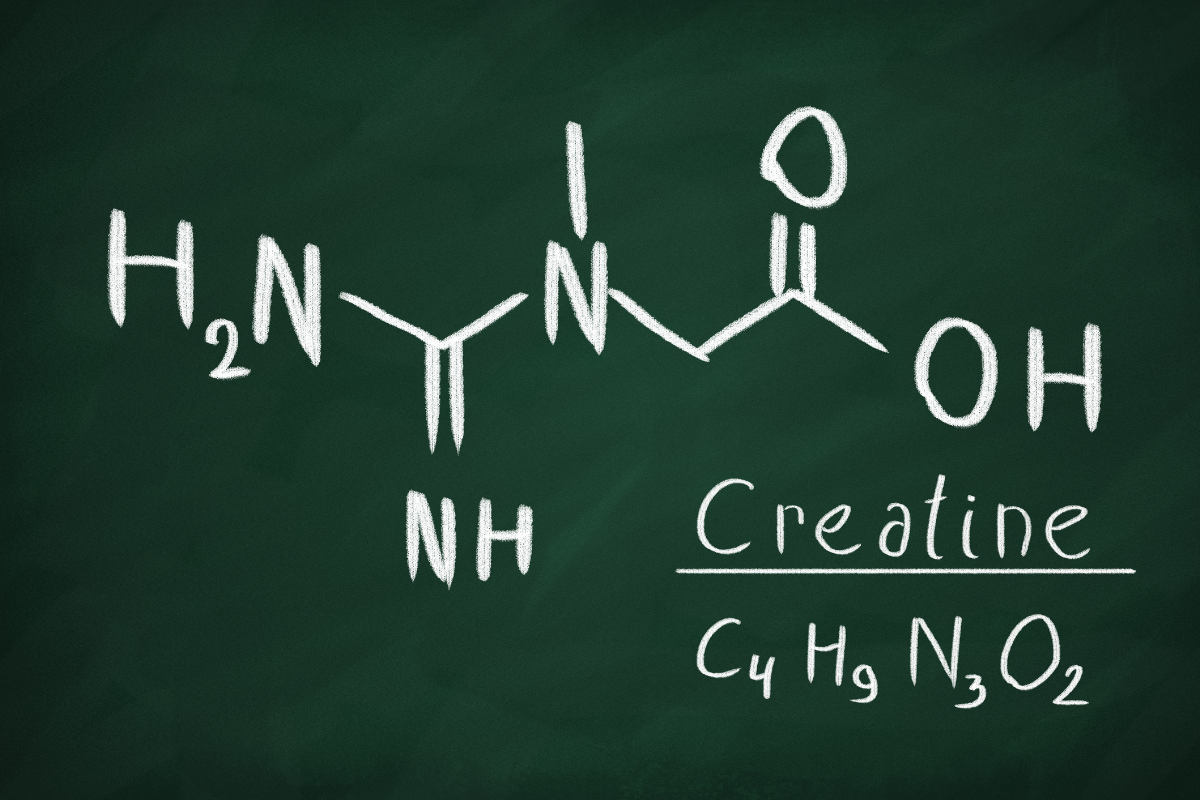
What is creatine?
Because athletes and bodybuilders are constantly looking for an edge to help their performance, it’s no surprise they often turn to one of the most-studied nutritional supplements for enhancing athletic performance: creatine.
But what is creatine, what can it do for your health, and how does creatine support muscle building? If you want creatine explained, then here’s your answer. Creatine, an amino acid stored mostly in skeletal muscle, is necessary for creating ATP – the body’s readily usable form of energy. Creatine is especially needed by your muscles during high-intensity exercise and training because it helps recharge the body’s energy level.
Half of the body’s creatine stores come from consuming creatine in food – mainly from meat, fish, and eggs – or from supplementation, while the other half comes from creatine’s synthesis in the liver and kidneys from amino acids.1
How does creatine work?
Creatine supplementation supports a well-hydrated environment, indicated by water mass gains, which in turn supports protein and carbohydrate metabolism both during and following exercise.2 Because creatine helps maintain hydration within the cells, an individual might actually weigh more when stepping on the scale after exercise because the supplemental creatine holds onto water in the muscles.
What is creatine good for?
The body’s physiological need for creatine increases with regular strenuous exercise and when muscle damage occurs. For an athlete, creatine helps the body more efficiently create energy to engage in activity.
Creatine effects on the body
What does creatine do for athletes and weightlifters? Does creatine support muscle building? Yes, creatine supports the building of lean muscle. Much research over the past 10 years has examined the effects of creatine supplementation with resistance training. So, what is creatine’s role in muscle development and does creatine work? Research suggests numerous physiological changes occur with creatine supplementation, including supporting energy production, while helping to support endurance, power output and the growth of lean muscle. Supporting these systems can result in increased training capacity.2
In addition to the athlete population, creatine has been shown to help support lean muscle mass in older individuals experiencing sarcopenia.3
Cognitive support: what is creatine’s role in mental function?
Although creatine is best known for its role in athletic performance – to enhance an exercise program – research is emerging on its benefits for cognitive function. If you engage in intense mental work or experiencing sleep deprivation, then creatine can provide support for cognitive function so you can perform at your best.
Is supplementing with creatine safe?
Research indicates that regular use of a creatine supplement is safe. One study concluded that supplementing with up to 30g of creatine daily for five years resulted in no notable negative side effects.4
How to use creatine
Although it is okay to vary the time you take creatine based on your schedule, it is recommended that you take it around your workout window. Creatine is usually best absorbed 30-90 minutes before or after exercise and consistency in taking it is the crucial factor.
- Bemben M, Lamont H. Creatine supplementation and exercise performance. Sports Med2005;35(2):107-125.
- Volek J, Rawson E. Scientific basis and practical aspects of creatine supplementation for athletes. Nutrition 2004;20(7-8):609-614.
- Martone A, Lattanzio F, Abbatecola A, et al. Treating sarcopenia in older and oldest old. Curr Pharm Des 2015;21(13):1715-1722.
- Kreider RB, Kalman DS, Antonio J, et al. International Society of Sports Nutrition position stand: safety and efficacy of creatine supplementation in exercise, sport, and medicine. J Int Soc Sports Nutr 2017;14:18.
Share:
Related Posts

Benefits of Creatine in Perimenopause and Menopause
Written by Maura MacDonald, MS, RD, CSSD | 2025 As we age, the notion is that we will inevitably become weaker. Not as mobile as

Goodbye Pie Chart, Hello Phase 1 Sliders
Written by Allison Smith, ND | 2025 As we usher in a new era of DUTCH testing which leaves behind the concept of the three-way

Introducing the DUTCH Dozen
Written by Kelly Ruef, ND | 2025 Hormone testing can be complex, which is why Precision Analytical developed the DUTCH Dozen, an interpretive framework that

DUTCH Report Enhancements
Written by Hilary Miller, ND | 2025 Precision Analytical have released the newest version of the DUTCH Test. This is the report’s most significant update

Gallbladder Health 101: What It Does and How to Keep It Working Well
Written by Ashley Palmer & Pooja Mahtani | 2025 The gallbladder may not get much attention compared to the gut, but it plays a central

